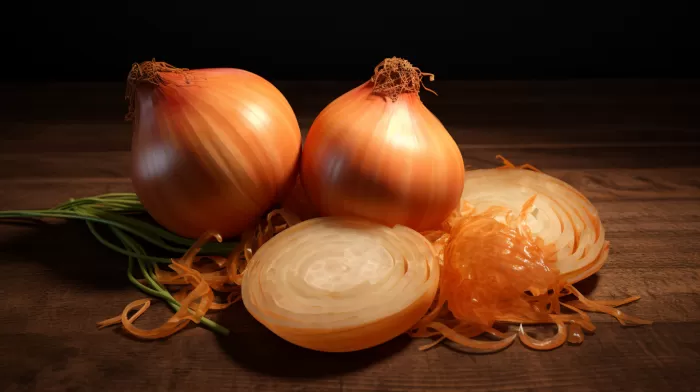Onion skins might seem like a trivial food waste, but with over 500,000 tons produced every year in countries like Spain, Holland, and the U.K, it turns out they pack a powerful nutritional punch. The discarded outer layers of an onion may hold the key to a healthier lifestyle, as they contain fiber and flavonoids with several health benefits. Let’s dive deeper into the health benefits that these onion skins offer and how they can help in combating various ailments.
Fighting Cardiovascular Disease
One of the primary reasons onion skins are believed to be useful to our health is because of their ability to combat cardiovascular diseases. Onion skins contain quercetin, a flavonoid that works as a natural antioxidant. Quercetin helps to reduce inflammation and lower blood pressure, thus reducing the risk of developing cardiovascular diseases. The American Heart Association recognizes quercetin’s potential in reducing the risk of heart disease and stroke due to its anti-inflammatory properties.
Reducing Cancer Risks
Onions are a rich source of organosulfur compounds, which have been linked to cancer prevention. These compounds are found in high concentration in onion skins, making them a valuable source of cancer-fighting nutrients. The National Cancer Institute acknowledges the benefits of organosulfur compounds in onions for their potential to inhibit cancer cell growth and induce cancer cell death.
Managing Diabetes
Onion skins contain a type of fiber called inulin, which may help manage diabetes by improving blood sugar control. Inulin has been found to slow down the digestion of carbohydrates and lower the glycemic index of foods, thereby reducing the blood sugar spike after eating. The American Diabetes Association encourages the consumption of fiber-rich foods, such as onion skins, as part of a healthy diet for people with diabetes.
Weight Loss and Obesity Prevention
A diet rich in fiber from sources like onion skins may aid in weight loss and prevent obesity. Fiber helps maintain healthy digestion and promotes a feeling of fullness, which can prevent overeating. According to Obesity Action Coalition, a diet rich in fiber can help maintain ideal body weight and lower the risk of obesity-related health problems like heart disease, stroke, and diabetes.
Boosting Immunity
The antioxidants and phytochemicals present in onion skins can help strengthen the immune system and fight off infections. Antioxidants neutralize free radicals, which can damage cells and lead to various diseases. By incorporating onion skins and other antioxidant-rich foods in your diet, you can give your immune system the support it needs to stay healthy.
Other Health Benefits
The benefits of onion skins don’t stop at the widely recognized diseases mentioned above. These nutritional powerhouses also contribute to:
- Skin health: Onion skins are rich in vitamins and minerals like vitamin C, which contributes to healthy skin by aiding in the production of collagen.
- Eye health: Quercetin, present in large amounts in onion skins, has been found to have potential positive effects on eye health, including reducing the risk of cataracts.
- Bone health: Onions contain a compound called GPCS, which has been shown to help prevent bone loss in postmenopausal women.
Utilizing Onion Skins
While most of us tend to discard onion skins, it’s worth considering ways to include them in our diets. Here are some simple ideas for incorporating onion skins into your meals:
- Soups and broths: Add whole onion skins to your soups, stocks, and broths for an extra dose of nutrients. Simply strain them out before serving.
- Tea infusion: Create a healthy and flavorful tea by steeping onion skins in hot water. You can add other ingredients like ginger, cinnamon, or honey to improve the taste.
- Powder: Dry onion skins, grind them into a fine powder, and use it as a healthy seasoning for your meals.
Final Thoughts
As we can see, onion skins offer numerous health benefits, with the potential to help prevent and manage many common ailments. By incorporating onion skins into our diets, we not only make use of valuable nutrients but also contribute to a more sustainable and waste-free lifestyle. So the next time you’re chopping onions for your meal, remember not to discard those skins – they hold a hidden treasure trove of health benefits!



